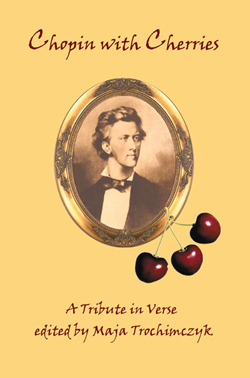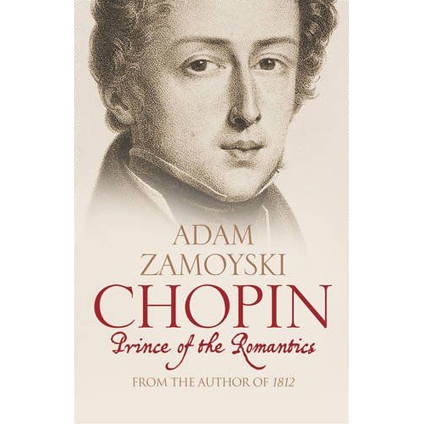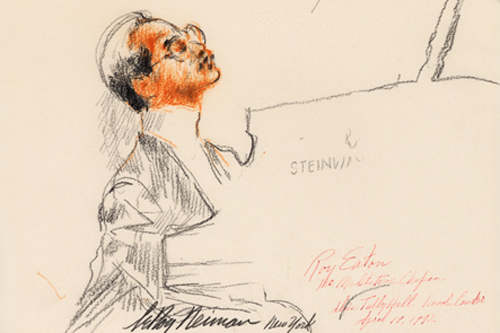 Chopin with Cherries
Chopin with Cherries
A Tribute in Verse
Edited by Maja Trochimczyk
Illustrated in color with 48 vintage postcards
Moonrise Press, 2009, 256 pages
ISBN 978-0-9819693-0-5
For my father, a Polish refugee after World War II, Chopin was the sound of Poland. Listening to the Polonaise or the nocturnes or the folk songs Chopin re-imagined, my father heard the land that he came from, the snow falling in winter, the earth thawing in spring, the children going to church early on Easter Sunday morning. My father heard the land in this music, and he knew what Chopin knew, that he would never return to it, that this music was the closest he would ever get to it.
It was all that simple for my father.
And Chopin must have felt something of that simplicity himself for didn’t he say about his music, “Simplicity is the final achievement. After one has played a vast quantity of notes and more notes, it is simplicity that emerges as the crowning reward of art.”
But in this simplicity there’s also complexity, of course, and Maja Trochimczyk’s Chopin with Cherries, a collection of poems celebrating Chopin’s 200th birthday, is a masterful celebration of this composer and the complex range of emotions, impressions, memories, and dreams his music evokes.
Ms. Trochimczyk’s introduction to this collection of more than 200 poems by more than 100 poets clearly sets the stage for this complexity. She gives the reader an appreciation of the range of poets represented in the volume. Not only is the great Polish poet Norwid here in a new translation by the Polish-American poet Leonard Kress, but so are the Modernist giants T. S. Eliot and Amy Lowell and the Cowboy poet Clark Crouch and a number of young poets just now establishing their voices in the 21th century. These poets and the more than 100 others in Ms. Trochimczyk’s collection offer their own personal sense of what Chopin wants us to carry away from his music.
Each of these writers says, in effect, here is what I felt when I heard Chopin, here is what I thought while listening to him. These writers enter into a dialogue with Chopin, and the reader is then invited to enter into this dialogue also. As Chopin’s music plays through our memories, we are asked to listen to Elisabeth Murawski and Charles Fishman and Oriana Ivy and so many other fine poets talk intimately and clearly about what they heard in Chopin’s music and how it made them feel; and then we are invited to gauge our own feelings and thoughts alongside theirs and alongside Chopin’s music.
Chopin – in his music, his life, his effect on his listeners – is the muse that all of the poets in this collection are inspired by, and the poems this inspiration has produced invite us to join in and consider how we too have been touched by Chopin, by his music, his life, his relationships with others, his sense of history, his love of Poland.
The resulting dialogue between Chopin, the poets, and the reader of this fine collection of poems is finally inspiring and exhilarating. The dialogue touches on beauty, the history of Poland, what it means to be an exile, the nature and end of art, and practicing Chopin on the piano as a child and hearing Chopin in the most unlikely places.
Every reader of Chopin with Cherries will bring away from this volume his own favorite moments, the ones that touch him most deeply. That’s simply the nature of art. For me, these moments occurred in reading the poems that Maja Trochimczyk organized around the headings “Nocturnes” and “Playing.” In the former, the poems by Elisabeth Murawski, Lola Haskins, Linda Nemec Foster, and Victor Contoski come closest to expressing Chopin’s dynamic duality, a duality that Foster writes about so beautifully and convincingly in her poem “Mazovian Willows.”
The poems about playing Chopin also moved me. As a child, I struggled with music lessons, and reading these memoiristic poems about playing Chopin, the struggle between our slender gifts and our desire to give his music the care it deserves, brought me back to those days. I especially enjoyed the trans-generational complexity of Mira Mataric’s “Chopin and I,” a poem about a woman who, having given up as a child on ever playing Chopin, confronts her own child’s desire to stop playing the Chopin the parent still loves.
Finally, let me say that I cannot remember reading an anthology of poems centered around a single-theme that I liked more. The poems Maja Trochimczyk has gathered together to commemorate Chopin’s 200th birthday are inspiring and exhilarating, as I have already noted, and I don’t know how else to say this – fun to read.
CR



